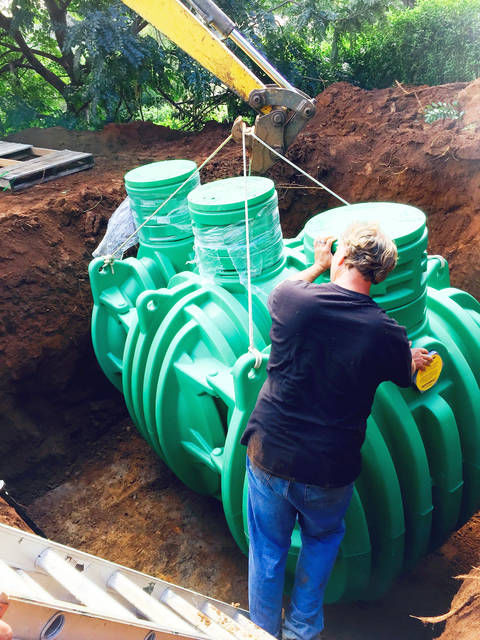This is the fourth in a series on the factors relating to the health of coral reefs globally and around Kauai. Watch upcoming issues of The Garden Island for articles investigating the connection between watersheds and reefs, things affecting reef health, and ways individuals can help save the reefs.
HANALEI — A different way to process waste could be the answer to the problem of cesspools leaking bacteria, nutrients and pharmaceuticals that can affect human and marine health.
That’s because things like bacteria, pharmaceuticals, excess nutrients and hormones leak from cesspools and septic systems and onto the coral reefs surrounding the island, experts say.
“Some chemicals, such as human-based estrogen, have been detected on coral reefs in close proximity to sewage sources, but the impacts to corals are unclear,” said Eric Brown, marine ecologist with National Parks Service.
And it’s still not clear how much of the pollutants that are in the water are from agricultural activities versus urban cesspools and septic systems.
“Tracer studies in Hanalei indicated that nutrients such as nitrogen coming from land were associated with fertilizer rather than domestic sewage,” Brown said.
The same was true for tracer studies of cesspools at Kalaupapa.
“The excess nitrogen in the system, however, can result in harmful microalgae blooms in Hawaii, so in areas where sewage derived nitrogen is prevalent, then it can cause problems,” Brown said.
There are an estimated 14,000 cesspools on Kauai.
So, efforts are ongoing on both Kauai’s north and south shores to switch out old septic systems and cesspools for advanced treatment units, or ATUs.
“They treat the water and turn it almost potable again,” said Tom Goff, who has been involved with wastewater for about 15 years.
Goff, who owns and operates Island Septic Solutions in Makaweli, has now installed seven different types of ATUs, two of them on Kauai — one in Hanapepe and one in Lawai.
Septic systems and cesspools just hold waste; neither treats the material.
Septic systems have a tank that holds the material while it decomposes and then goes out into a leach field, cesspools are a hole in the ground, simply put, that sometimes drain into a septic system.
ATUs have three chambers: a trash chamber that collects waste, a treatment chamber and a clarifying clamber. Once waste travels through the three chambers, there’s the option of disinfection with ultraviolet light.
After it’s been treated, the nearly-potable water, which “looks clear and very much like clean water,” Goff said, or has been disinfected with UV light, goes into a leech field.
With extra equipment, it could even be funneled into an underground drip grid.
The two ATU systems he’s installed so far are made of plastic imported from a company on the mainland and assembled on Kauai. Goff said the goal is to purchase forms and actually make the infrastructure for ATUs on-island.
“We’ll be able to employ some more people on the island and help protect the environment at the same time,” Goff said.
The idea is a good solution to two of the island’s challenges according to Kapaa marine biologist, Katherine Muzik.
“Pharmaceuticals and hormones, all that stuff that’s coming out of the cesspools, are showing up in the ocean,” Muzik said. “We have to change (the island’s wastewater system), and that’d also be jobs.”
Finding employment within the realm of the environment is difficult, Muzik said, and more job openings would help boost environmental conservation activities and awareness.
“That’s why ATUs are so exciting, because they would employ landscapers and people to drive the bulldozers,” Muzik said. “It’d be a lot of work to replace (every septic and cesspool) on the island.”
In Hanalei, homeowners could get around $15,000 in federal and state money to replace their current wastewater system with an ATU, thanks to the Hanalei Watershed Hui.
There’s also a possibility of securing $10,000 in tax credits from the state.
In December, the hui secured funds from the US Environmental Protection Agency and the state Department of Health to assist in replacing cesspools with ATU systems distributed by Waipono Pure, a Honolulu company.
They’re focusing on cesspools over septic systems, because they’re more harmful for the environment.
“We can’t force someone to use one system over another, but we do have one that we recommend,” said Maka‘ala Ka‘aumoana, executive director of the Hanalei Watershed Hui.
Waipono Pure is the least expensive system that still has UV disinfection capabilities, Ka‘aumoana said.
Goff is installing ATU systems from the distributor Norweco.
The Hanalei Watershed Hui has the opportunity to replace cesspools at 15 owner-occupied properties and at two vacation rentals.
The contract allows for grant money to cover up to half the cost for design, engineering and installation, up to $15,000 for owner occupied homes.
For vacation rentals, the hui can pay up to 25 percent or up to $7,500 for the project.
The grant money has a three-year expiration period and it’s a year into the time frame.
“We haven’t had any takers yet and that’s discouraging,” Ka‘aumoana said. “I’d like to have some people out and the money won’t be around forever.”
Both Goff and Ka‘aumoana said prices on ATU projects, everything included, varies depending on access and other factors on the properties, but can generally run in the $20,000 to $30,000 range.
A drawback to installing an ATU is that they require electricity to operate and a backup generator will be required in case of power outages.
“It has a pump and a fan and this UV light so you’ll add something to your electricity bill,” Ka’aumoana said.
But those who are looking for a way to help out the environment, or to update their wastewater storage anyway, the opportunity is available.
“It’s important that we protect our water quality and this is a way to do it,” Goff said.



